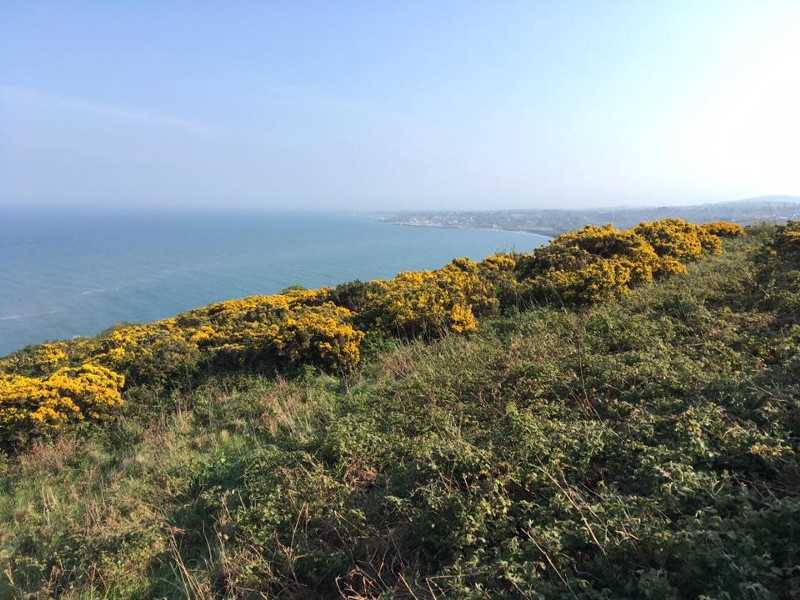 The sun cleared in Dublin. So I took the train down the coast and went for a hike.Is a vacation a product, a project, or a **(product/project)
The sun cleared in Dublin. So I took the train down the coast and went for a hike.Is a vacation a product, a project, or a **(product/project)
portfolio? **Let’s ponder…
- Varied: Vacations can be cheap, expensive, short, long, open ended, risky, chill, structured, loose, adventurous, etc.
- Value: Vacations deliver value in different ways. Sometimes you have to wait until the end of the adventure to get the big payoff. Perhaps you measure hours on the beach, time with friends/family, number of “next level, epic” Facebook images shared, or items checked off the bucket list.
- Optionality: You can find deals by booking early. And you can find deals by booking late. Purchasing early buys certainty. Purchasing late or at the register, buys you options. You can buy all-inclusive package tours, self-guided itineraries, or just mix-match-wing-it.
- Expensive Options: It is possible to pay too much money to keep your options open, and also pay too much money for complete certainty (which is sort of the same thing). If we bring a ton of gear we can do “anything we want”. But traveling with a lot of luggage costs money, storing gear costs money, and traveling light gives us flexibility. Same goes with paying crazy rates for a last minute hotel in a major city during the annual herding of the goats (though maybe your wins justify this loss)
- Cheaper Options: There are “cheap” ways to keep your options open … like convertible pants/shorts, buying flex-tickets and rails passes, a good travel abroad data plan, making multiple restaurant reservations, and not pre-purchasing tickets when you can walk onto the bus. Rental cars are a tough call. They provide mobility, but also keep us from drinking too much wine over dinner. Insider knowledge — privileged knowledge — can give you an edge in terms of optionality Little did we know … we had to drive DOWN a different road* Budgeting: How do you budget for your vacation? Is there a cap? Have you budgeted so that you can take advantage of serendipitous situations? Do you do a per-day food and adventure budget, or just unfreeze the credit card and live it up?
- Planning: Some people know exactly where they will go every day. Other people plan around food and drink, and leave the rest up to hangovers and the weather. My friend Andy plans “a full one week on a beach not having to think about anything” and then “plays it by ear depending on how relaxed I feel”. My friend Sith “reads Lonely Planet front to back on the plan and highlights the cool things” because he is “incredibly busy”, and doesn’t like to “stress with the planning”.
- Information: How do you plan: books, travelogues, novels, TV shows, YouTube, the advice of friends, Tourist Kiosks … or not at all (you bought the package OR completely wing it) ? How much information do you gather based on your experiences “on the day”, or from people you meet along the way?
- Time: Most of us need to travel between fixed dates and fixed locations. But what about an open-ended vacation? I remember traveling to Buenos Aires and hanging out until it “got old”. Then I traveled down to Patagonia and (because I brought some gear) trekked for a week +/- a couple days.
- Skills: How are your travel skills? Some people I know always seem to end up stumbling into the best situations. Other people are map-challenged, and end up eating the fake local food. Can you sleep on a plane? Are you comfortable with the discomfort of not knowing the language? How about train/bus travel in foreign countries … is that your thing?
- Dependencies: What about constraints and dependencies? Are you a vegetarian, scared of water, afraid of heights, or committed to visiting an old friend for a day before you fly out? Do you need a visa? Did you need shots? If we travel with friends we gain some things — it’s safer, we can share the driving, and we can divide and conquer when it comes to planning — in exchange for some downsides (hard to please everyone, coordination challenges, etc.)
- External Funding: How does your attitude change if somebody else is funding the vacation? For example, my friends did a bucket-list wedding registry. They were so absolutely grateful, but it also meant that they were forced to do everything on their bucket list while traveling through Australia and New Zealand. It “got tiring”, but they felt indebted to get the Instagram shots (yay, bungee jumping). Or maybe, after spring break, you had to answer to your parents about why there were liquor store charges on your jointly held credit-card and a room cleaning charge. How irresponsible of you! So what is it? Product, project, product portfolio, or project portfolio?